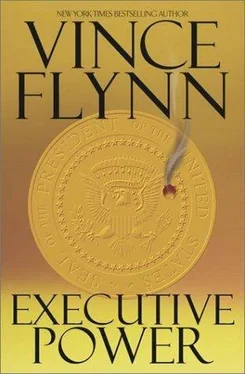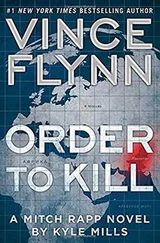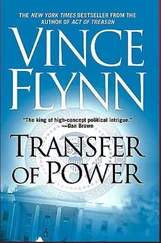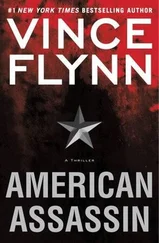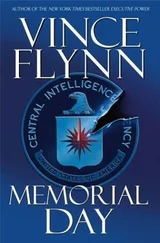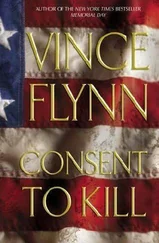"You should be paying no one," snarled Hamza.
"You should slit the throat of the first person who gets in your way. Hamas and Hezbollah are on a mission from Allah and anyone who trifles with them should be dealt with harshly." The general shook his head in disgust.
"You will never defeat the Israelis until you learn to control your own people."
Biting down on his tongue to restrain himself from smiling, David nodded thoughtfully. He and the general had arrived at the same conclusion, but for different reasons. David would unite the Palestinian people and he would start by killing the arrogant Iraqi brute who was sitting across from him.
Rapp was shown into the Oval Office by one of the President's aides. He found his boss, Irene Kennedy, and General Flood, the chairman of the Joint Chiefs, sitting alone on one of the couches with a series of folders spread out on the coffee table.
Rapp could tell instantly that Kennedy had broken the news to the four-star general. The stony expression on the soldier's face said it all.
It was hard enough to lose men in battle but it was beyond infuriating to know that it could have been prevented.
Rapp decided that given the subject at hand it was better for him not to speak. Before he had a chance to sit, President Hayes entered his office with a cortege of aides trailing him. At over six feet tall with a full head of salt-and-pepper hair, Hayes stood out in a crowd, and like most men who had reached his station in life, he exuded a real magnetism.
The men and women who worked for him wanted desperately to please him. Hayes unbuttoned his suit coat as he strode toward his desk. By the time he reached it the coat was off. He turned to face the three aides who were arguing about the administration's education bill.
Hayes held up his hands, palms out, and the three fell silent like well-disciplined kids obeying their father.
As Rapp watched the exchange take place he noticed, not for the first time, that the President had gained a little weight. It was a subject the two men had discussed on several occasions. Rapp, a former tri-athlete still worked out six days a week and watched his intake closely.
The President had confided in him that he was very wary of what his job was doing to his health. After all his official duties, which there was scarcely enough time for, there was still the Democratic Party and its incessant need to raise money.
Barely a day passed when there wasn't a fund-raiser of some sort, and where there was a fund-raiser one could always count on lots of food and booze. Rapp had designed a bare-bones workout plan that the President could do in forty-five minutes. The goal was to do it five days a week, first thing in the morning. As Rapp looked at the President's expanding waistline, he had a feeling the man had been skipping his workouts.
"I don't want to talk about this anymore," said the President firmly.
"By the end of the day I want you all on the same page. If the three of you can't come up with a consensus, this thing will be dead before it reaches the Hill." One of the aides tried to get in a last word, but the President cut her off with a terse motion toward the door. The three left the room dejectedly and closed the door behind them.
Hayes dropped into his chair and picked up a pair of reading glasses from the desk. After quickly glancing over his schedule, he pressed his intercom button and said, "Cheryl, I don't want to be interrupted for the next fifteen minutes."
"Yes, Mr. President," came the always even reply of his gatekeeper.
Hayes looked up and waved for his three visitors to join him.
"Pull up a chair. If you don't mind, I have to look over a few things while we talk."
Kennedy had called the meeting and she didn't object. She knew once the President heard what she had to say, she'd have his rapt attention.
As they settled in, the President picked up a document from his desk, scanned it and then moved it to another pile. Looking over the top of his reading glasses he said, "Mitchell, you look tan and rested. I trust you had a nice honeymoon? "The President smiled.
"Very nice, thank you, sir."
"Good." Getting down to business, Hayes turned to Kennedy and said, "I get the impression that whatever it is you have to tell me, it's not good."
"That's correct, sir."
Before Kennedy had a chance to elaborate, the door to their left flew open and the President's chief of staff entered the room with a big cup of Starbucks coffee in one hand and a cell phone and stack of files precariously balanced in the other.
"Sorry I'm late."
Rapp leaned forward and shot his boss a questioning look. He mouthed the words, What the hell is she doing here?
Kennedy made a calming motion with her hand and ignored Rapp.
Kennedy's cool attitude did nothing to still Rapp's apprehension over Valerie Jones. She was a pushy and obnoxious political operative.
If she were a man she would be referred to as a tough bastard or prick, but since she wore a skirt to work she was simply called a bitch. Rapp couldn't remember a time when he hadn't been at odds with the woman. Her first reaction at the onset of any potential crisis was to ask how it would affect the President's poll numbers. It drove Rapp nuts that every issue had to be parsed, muddied and then spun.
Putting Rapp in a room with Jones was like one of those crazy chemistry experiments where you started pouring different things into a beaker knowing full well there would be an explosion, and ultimately a mess to clean up. With Jones now in attendance it was highly likely that Rapp's mood would go from sour to downright shitty.
Before the meeting was over things would get ugly between the two, and Kennedy was counting on just that. For things to work out the way she hoped, everyone needed to play their role, and in the end, she was confident where the President would come down. Irene Kennedy had learned many things from her old boss, Thomas Stansfield.
He had been fond of reminding her frequently that they were in the secret business; both collecting and keeping.
Common sense dictated that the less one talked the more likely it was one would learn secrets rather than give them away. He also liked to say the outcome of a meeting is often decided before a single word is spoken. It is decided by who is asked to attend. That was exactly what Kennedy had had in mind when she invited Jones.
The woman could adopt a passive attitude if she absolutely had to.
If a foreign head of state was visiting the White House she might tone her act down, but that was about it. Valerie Jones was an obsessive-compulsive workaholic who lived and breathed politics. It was her life.
She wanted to be involved in every decision, for in the arena of politics, anything the President attached his name to would ultimately affect his chances for reelection.
Nudging a small bust of President Eisenhower out of her way, the President's chief of staff plopped her files down on the corner of his desk. Neither Rapp nor General Flood made an effort to get her a chair. In the PC. world of D.C. politics both knew such a gesture could be misperceived, and they might get their balls chewed off. And besides, neither of them liked Jones enough to make the effort.
When the chief of staff was settled, the President looked at Kennedy and said, "Let's hear it."
The ever placid Kennedy cocked her head slightly and brushed a strand of her shoulder-length brown hair behind her ear. As had been the case all too often lately, she was the bearer of bad news.
"Mr. President, General Flood informs me that you've been fully briefed on the failed hostage rescue in the Philippines."
"Yes," answered the President in a sour tone, "and needless to say I'm not happy about it."
Читать дальше
